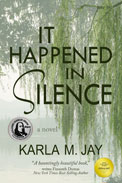
 |
Willow Stewart's spirit is as fiery as her curtain of red hair. Hers is the hardscrabble existence of a lifelong Appalachian in the early 1920s. She can't speak and has never made a sound in her fifteen years. Her brother Briar was banished fifteen months ago. Then her newborn brother dies, her mother falls ill enough to do likewise, and she must summon a traveling preacher from town and send a message to Briar inviting him to return, considering the circumstances.
Georgia society and law in 1921 are kind neither to women nor the disabled. Willow is kidnapped and nearly raped on her errand. She escapes, but not to better things. Well-meaning strangers wrongly believe Willow and her handicap are the products of incest and plan to enroll her in a school for the deaf, even though she can hear. She manages to evade authorities until an incautious train ride ends in her arrest as a runaway.
Willow's only comfort is that her two-month sentence to labor as a nanny will reduce the time Briar serves for vagrancy. Unfortunately, her custodians, the Dobbs family, belong to the Ku Klux Klan. Willow soon learns that blacks are another frequent target of mistreatment by both the government and the KKK. The nanny she replaces is a partly African American woman pregnant by rape and forcibly sterilized after the birth. Mrs. Dobbs won't say what became of the baby.
Lying comes naturally to Ardith Dobbs. It's how she overcame degradation of her own. If it means she takes numerous unwanted children to be murdered through neglect at a poorly monitored baby farm, so be it. As she nannies for Ardith, Willow discovers the pretentious woman's secret past, a past not unlike Willow's present. But if a newborn baby isn't safe around Ardith, nobody is.
Jay was a speach therapist for nearly forty years. This is her second historical novel. It addresses four social issues of the 1920s: women's suffrage, chain gang labor conditions, the murder of infants in foundling homes, and the secret workings of the Ku Klux Klan. Also prominent are the women's branch of the Klan and the hobo lifestyle. Riding the rails is a popular theme in Great Depression literature, but few sources mention the practice existing in the 1920s.
Jay does not hesitate to imbue her physically limited characters with complete personhood. For example, Willow, although nonverbal, is clever and far beyond functionally literate. She loves to read, in fact, and communicates with strangers in coherent sentences that she writes. She is also well-versed in recent history. She knows, for example, that although Henry Ford did not invent the motor car, he built the most efficient one available at that time. She also shows awareness that other people with disabilities exist and admires those, like Helen Keller, who have impacted their world. Indeed, she aspires to someday be a teacher like Keller. Like many young mountain women, Willow skillfully uses what her mother taught her to reap the benefits of healing herbs. She thus receives an education no different from other teenage girls of her time and place, suggesting that her loved ones do not perceive her condition as a handicap, an uncommon attitude toward disability in that era. As the book progresses, she falls in warmly reciprocated love, losing her fear that her muteness will deter a potential spouse, a frequent misgiving among women of disability, in particular.
Another well-developed character is Ardith. Some states ignored the suffrage granted to women in 1920. To Ardith's chagrin, in November of that year, Georgia women were denied the right to vote in the presidential election. The progressive women's movement contrasts with the Klan's conservatism. Ardith accepts the organization's insistence that women inconspicuously support their husbands and behave well publicly. Her only desired manifestation of independence is the right to vote. Otherwise, she longs for the Victorian ideal of a rich husband to look after her financially. Ardith and Willow are both mountain folk by birth. Willow longs to return to her mountain because it is her source of personal strength and moral rectitude. In contrast, the more of her past Ardith rejects, the weaker and more dependent she becomes, eventually stooping to such criminal acts as embezzlement and multiple murder.
Jay's book opens a window on a period of intense social change that is often only superficially explored in modern literature. Her deft characterizations alone make this novel a worthy read.
Honorable Mention in the 2022 Eric Hoffer Book Award Historical Fiction Category